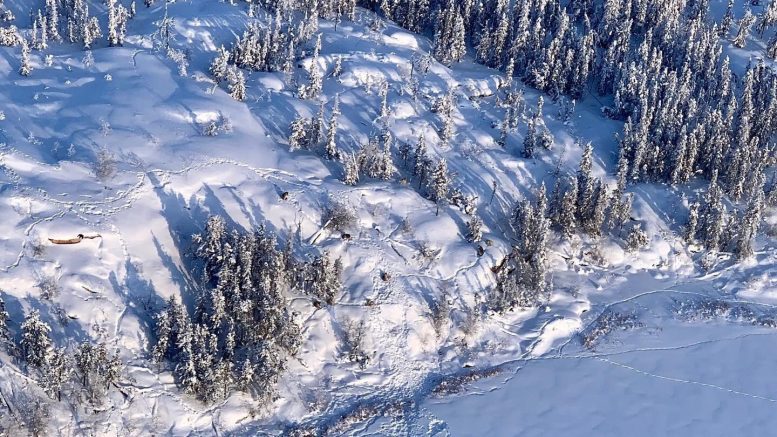As the days get longer and the temperatures hopefully get milder, the Royal Canadian Mounted Police in the Northwest Territories are advising people to be cautious as they head out on the land.
Tragically, three people died just under a year ago when their snowmobiles went through the ice on Great Slave Lake as they travelled at night from Dettah to Lutsel K’e.
Only one body was ever recovered.
Mounties are reminding hunters, snowmobilers and other outdoor enthusiasts that the wilderness can be dangerous if they are not adequately prepared for an emergency.
RCMP say the remoteness of certain areas means a delay in response time for search and rescue teams as well as police in reaching where you are in case of emergency.
ʺThe RCMP in the Northwest Territories is committed to the safety of its residents and visitors, and will deploy Search & Rescue (SAR) resources as needed. Outdoor enthusiasts need to be mindful of the vast areas and often difficult terrain within our Territory that may render a SAR deployment very dangerous for rescuers, and in some instances a search may not be possible due to a variety of risk factors. If you are heading out to explore, remember wilderness safety starts with you, be prepared!ʺ states Sgt, Christina Wilkins, NT RCMP Search and Rescue Coordinator.
On the land safety tips:
- Leave a trip plan – have a responsible emergency contact available in case of accident or delay. Download the AdventureSmart Trip Plan app at adventuresmart.ca and send it with a friend or family member.
- Wear or carry suitable clothing and proper footwear – dress in layers to regulate body temperature and adjust to sudden changes in weather conditions.
- Pack extra clothing for protection from the elements – Hypothermia is a serious risk if you go out unprepared for the weather conditions.
- Pack essential items – flashlight, spare batteries, signaling devices, extra food or water, GPS or compass, first aid kit, pocket knife. Make sure you know how to use these safely and that they are in working order.
- Ensure your communication devices are in working order and that you know how to use them.
- Be aware of cellular and satellite coverage in the area – it may be limited to highway corridors or impacted by physical obstacles which can block the signal.
- Avoid wildlife conflicts – know which animals are in the area and how to react if you cross their path.
- Know your limits – avoid injury and exhaustion.
- Take a course – familiarize yourself with the area and activity in which you are engaging.
If travelling on a snowmobile, these are important rules to follow:
- Always wear a helmet when you are within Yellowknife city’s limits, and wear it even though it’s not mandatory outside the city.
- Carry an emergency medical kit, emergency took kit (with spark plugs, belt) and extra food. If you are venturing out in a remote location, carry extra gas.
- Operate your snowmobile within your capacities and always sober! A snowmobile driver impaired by alcohol and/or drugs will face the same criminal code charges as when driving a vehicle impaired.
RCMP say several resources are available online to help you maximize your safety and plan your trips, such as AdventureSmart.
NT RCMP wishes everyone safe and enjoyable outdoor adventures.
John has been in the broadcast journalism industry since the 1980s. He has been a reporter in Yellowknife since 2012 and joined CKLB in January of 2018.
John covers the crime and court beat as well as reporting on other areas including politics, business, entertainment and sports.
He won seven national community newspaper awards while he was a journalist with Northern News Services Limited (NNSL).
John worked in Ontario before coming North including stints as a TV sportscaster in Peterborough and senior news writer for CBC and CTV in downtown Toronto.








